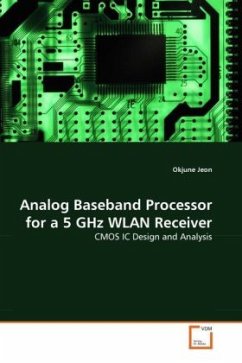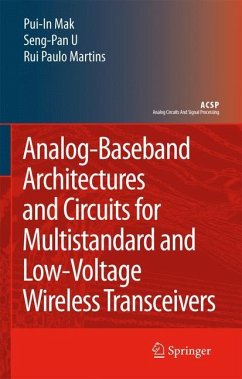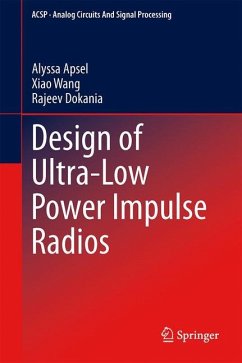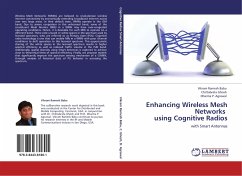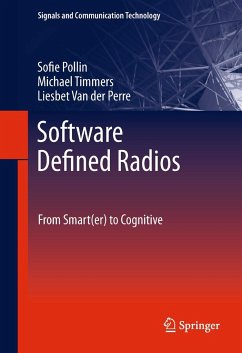
ANALOG BASEBAND DESIGN SOLUTIONS FOR MULTI-MODE WIRELESS RADIOS
Versandkostenfrei!
Versandfertig in 6-10 Tagen
32,99 €
inkl. MwSt.

PAYBACK Punkte
16 °P sammeln!
Current and future trends in the development of chipsets for 3G and 4G mobile handhelds call forachieving the highest performance/price ratio whichmeans the development of feature-rich multi-modewireless devices while maintaining the cost of addingmore features at a minimum. In this book, a novelcompact wireless radio transceiver architecturereusing a baseband chain so as to significantlyreduce the die area is proposed. To realize a highperformance direct conversion receiver for multi-modewireless communications, certain limiting factors inthe design should be identified and removed ormitigate...
Current and future trends in the development of chip
sets for 3G and 4G mobile handhelds call for
achieving the highest performance/price ratio which
means the development of feature-rich multi-mode
wireless devices while maintaining the cost of adding
more features at a minimum. In this book, a novel
compact wireless radio transceiver architecture
reusing a baseband chain so as to significantly
reduce the die area is proposed. To realize a high
performance direct conversion receiver for multi-mode
wireless communications, certain limiting factors in
the design should be identified and removed or
mitigated. One of the main factors addressed in this
book is the DC offset problem. Generation mechanisms
for DC offsets, both static and dynamic, are modeled
and DC offset cancellation schemes are proposed. The
design of an analog baseband chain for the proposed
compact wireless transceiver is also presented. This
book is intended for radio and mixed-signal IC
designers, graduate students in electrical and
computer engineering as well as marketing and product
managers of wireless chip sets.
sets for 3G and 4G mobile handhelds call for
achieving the highest performance/price ratio which
means the development of feature-rich multi-mode
wireless devices while maintaining the cost of adding
more features at a minimum. In this book, a novel
compact wireless radio transceiver architecture
reusing a baseband chain so as to significantly
reduce the die area is proposed. To realize a high
performance direct conversion receiver for multi-mode
wireless communications, certain limiting factors in
the design should be identified and removed or
mitigated. One of the main factors addressed in this
book is the DC offset problem. Generation mechanisms
for DC offsets, both static and dynamic, are modeled
and DC offset cancellation schemes are proposed. The
design of an analog baseband chain for the proposed
compact wireless transceiver is also presented. This
book is intended for radio and mixed-signal IC
designers, graduate students in electrical and
computer engineering as well as marketing and product
managers of wireless chip sets.




